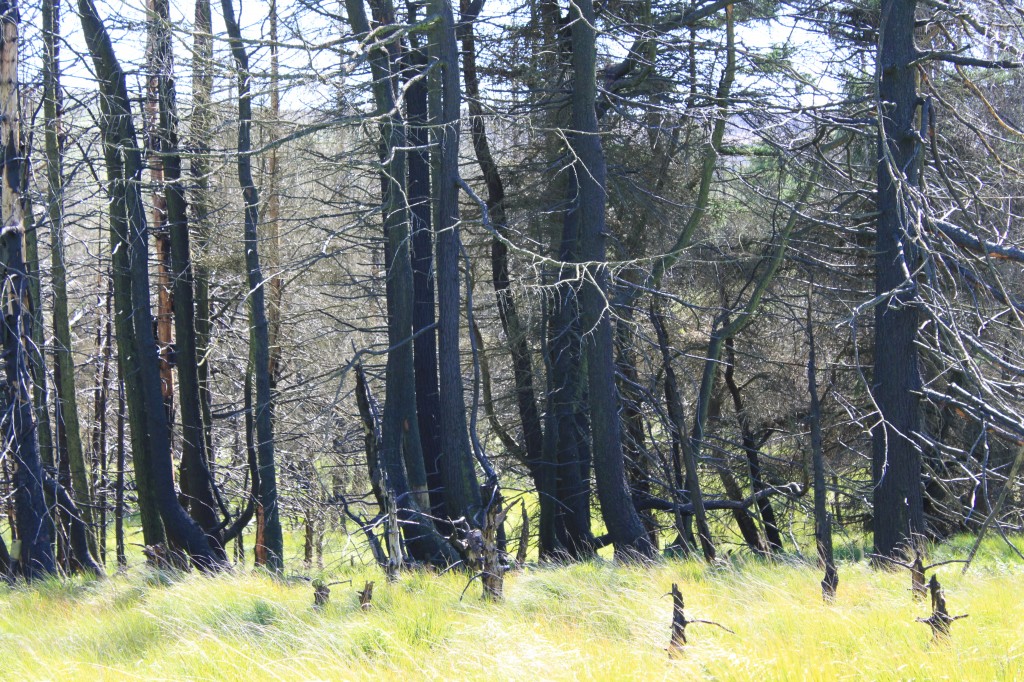Earlier this year, Natural England dropped a legal action which attempted to ban the owner of Walshaw Moor from burning peat bogs. I found this a bit odd and put in an Environmental Information Regulations request to Natural England, to try and find out what was going on.
Request to disclose Natural England’s expert witness statement
I asked Natural England to disclose the contents of the witness statement about Walshaw Moor land management, that Natural England’s Executive Director for Science, Evidence and Advice had prepared for a proposed judicial review that the High Court ordered into Natural England’s attempt to ban burning on Walshaw Moor.
This attempt was made in December 2011, when Natural England issued a Notice of Modification of Consent to Walshaw Moor Estate under Regulation 23 of the Conservation of Habitats and Species Regulations 2010, with the aim of preventing the estate from undertaking any burning (for four months).
I wanted to know what damage the Walshaw Estate’s peat burning and other peatland “management” practices were causing, and exactly why Natural England wanted to ban the Estate from burning peat.
The witness statement never reached the judicial review, since this was called off when Natural England dropped its prosecution of Walshaw Moor Estate. And so the information had no chance to become public via the judicial review.
Why I think this information is in the public interest
Without knowing what’s in the expert witness statement, we don’t know what Natural England thought the problems were with Walshaw Moor Estate burning the moor. And we can’t judge whether the new Environmental Stewardship Agreement that Natural England has signed with Walshaw Moor’s owner is going to solve the problems. This new Agreement allows Walshaw Moor to continue to burn blanket bog, under certain conditions.
Natural England has refused my request for information
Natural England refused my request, on the grounds that
“disclosure of the information would adversely affect the course of justice and the protection of legal professional privilege”
Natural England gave three reasons for this decision. The first two relate to the fact that the witness statement was prepared for a legal action.
Because the witness statement was prepared for “judicial proceedings”, the decision to publish the information rests with the judicial or inquiry system – not with Natural England.
Second, disclosing the information could “prejudice…possible future proceedings.” The letter Natural England sent me says,
“I have… looked at the particular circumstances of this case and I cannot rule out the prospect of future litigation. A judicial review has been threatened. …The information in the statement could be relied upon in any future legal challenges and Natural England needs to be able to defend itself.”
The letter makes this point twice. The second time, it says that although there is a public interest in disclosing the witness statement, this has to be weighed against the need to protect the judicial system’s ability to decide whether or not to disclose information, particularly given
“…the fact natural [sic] England believes there is real prospect of future litigation arising…”
So it looks as if Natural England is afraid that Walshaw Estate may take legal action against them – reversing the original direction of legal action, when Natural England tried to prosecute Walshaw Estate for breaking the law that protects habitats like blanket bog and heath.
Leeds High Court ordered a judicial review into Natural England’s attempt to ban burning and some other activities on Walshaw Moor Estate. The judicial review didn’t happen, because Natural England dropped their prosecution of Walshaw Moor Estate and reached a settlement with them. But it looks as though Natural England is afraid that it might still happen.
There’s a lot more information about this whole issue on Mark Avery’s blog.
The final reason that the letter gives for withholding the witness statement is that
“there is a need for a safe space for government and public servants to formulate and debate issues away from public scrutiny.”
The letter explains this by referring to the possibility of:
- inaccurate and sensationalist journalism (“the threat of lurid headlines depicting that which has merely been broached, as agreed policy”)
- the risk of causing confusion among the wider public, who (poor idiots that we are) may mistake discussion of policy options for policy decisions
- distracting civil servants from focussing on and contributing to the current debate, and instead taking up their time with responding to public misconceptions
So Natural England seems to lack confidence in anyone’s ability to communicate clearly – they apparently doubt that:
- they themselves can present information clearly
- the press can report accurately
- the public can understand what we read
Well, I find this all a bit pathetic. What does it say about our education system if neither government, civil servants nor media have the skills to communicate accurately? And are we, the public, really such dolts as Natural England seems to believe?
I thought the whole purpose of democracy was precisely for the public to scrutinise the decision making of our elected representatives and public servants. Whatever happened to the idea that “The price of freedom is eternal vigilance?”
The Aarhus Convention and the public right to participate in environmental decision making
Also, the Aarhus Convention places a legal duty on the UK government to protect the public right to environmental information and participation in decision making about environmental issues. The government also has a legally-required duty to provide the public with easy and effective access to justice if that right is denied.
But in 2010, the Working Group on Access to Environmental Justice, chaired by Lord Justice Sullivan, reported that the Aarhus Convention Compliance Committee had taken the UK to task for “failing to live up to its obligations under Aarhus.”
Updated 31st August.

